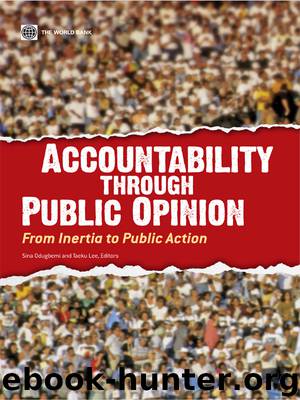Accountability through Public Opinion by Sina Odugbemi

Author:Sina Odugbemi [Odugbemi, Sina; Lee, Taeku]
Language: eng
Format: epub
ISBN: 978-0-8213-8505-0
Publisher: The World Bank
Published: 2011-04-16T04:00:00+00:00
Theoretical and Policy Implications
The research described in this chapter has theoretical implications for four key fields of inquiry: comparative democratization, political participation, institutional trust, and constitution making. It also offers lessons on “best practices” for policy makers involved in these spheres of activity.
For scholars of democratization, this work demonstrates that political attitudes are subject to short-term influences and are not solely the product of long-term socialization.15 However, it also warns that political culture is not easily crafted. Democracy promoters seek to simultaneously raise democratic norms and institutional trust—making new democracies both more democratic and more stable. Scholars of democratization similarly assume that advances in one attitude will spill over into the other: Higher trust in government will build support for system norms and greater attachment to democratic attitudes will foster trust in the new institutions.16 My research indicates that, initially, these goals may be incompatible. During transitions, when institutional performance is low, increases in democratic attitudes are likely to create expectations that undermine institutional trust. Only when institutional performance improves will increases in democratic attitudes and knowledge be accompanied by higher trust.
Moreover, elevating political trust may be not only difficult to achieve in new democracies, but also undesirable. This research calls into question previous assumptions about the constellation of attitudes that are conducive to democratic development. Although most scholars presume that distrust threatens the democratic project, I argue that the development of critical capacity is advantageous for democratization, especially in the medium and long term. In the current wave of transitions from authoritarian rule, regimes are less likely to experience dramatic breakdowns that reinstate dictatorships and more likely to stabilize under hybrid systems that fall short of liberal democracy (Bratton, Mattes, and Gyimah-Boadi 2005; Bratton and van de Walle 1997; Diamond 2002; Levitsky and Way 2002). Transitioning polities are not well served by naive publics who overestimate the quality of democratic governance.17 In Uganda, active citizens are seemingly more attached to democratic principles and constitutional rules, and simultaneously more attentive to the flawed democratic performance of their political institutions. Uganda’s informed distrusting democrats are thus more inclined to hold their leaders accountable to constitutional standards and to push for democratic improvements. Institutional distrust, combined with civic engagement, democratic attitudes, and support for fundamental rules, seems to offer the best recipe for furthering democratization, although individual-level attitudes alone are not sufficient to guarantee progress.
This work also has implications for the study of political participation in both hybrid systems and consolidated democracies. It revises our understanding of political participation by highlighting the critical role that context plays in conditioning the influence of participation on citizen attitudes.18 By comparing the results in Uganda with the existing studies of developed democracies, I highlight the importance of institutional performance and information environments.19 In addition, the Ugandan case holds lessons for practitioners seeking to use participation to foster democratic culture. First, much of the participation in the Ugandan process was organized by appointed officials and civic groups rather than by politicians seeking votes. These officials had
Download
This site does not store any files on its server. We only index and link to content provided by other sites. Please contact the content providers to delete copyright contents if any and email us, we'll remove relevant links or contents immediately.
| Anthropology | Archaeology |
| Philosophy | Politics & Government |
| Social Sciences | Sociology |
| Women's Studies |
The Secret History by Donna Tartt(19092)
The Social Justice Warrior Handbook by Lisa De Pasquale(12190)
Thirteen Reasons Why by Jay Asher(8912)
This Is How You Lose Her by Junot Diaz(6888)
Weapons of Math Destruction by Cathy O'Neil(6281)
Zero to One by Peter Thiel(5802)
Beartown by Fredrik Backman(5756)
The Myth of the Strong Leader by Archie Brown(5509)
The Fire Next Time by James Baldwin(5447)
How Democracies Die by Steven Levitsky & Daniel Ziblatt(5219)
Promise Me, Dad by Joe Biden(5154)
Stone's Rules by Roger Stone(5088)
A Higher Loyalty: Truth, Lies, and Leadership by James Comey(4964)
100 Deadly Skills by Clint Emerson(4926)
Rise and Kill First by Ronen Bergman(4790)
Secrecy World by Jake Bernstein(4753)
The David Icke Guide to the Global Conspiracy (and how to end it) by David Icke(4720)
The Farm by Tom Rob Smith(4514)
The Doomsday Machine by Daniel Ellsberg(4490)
